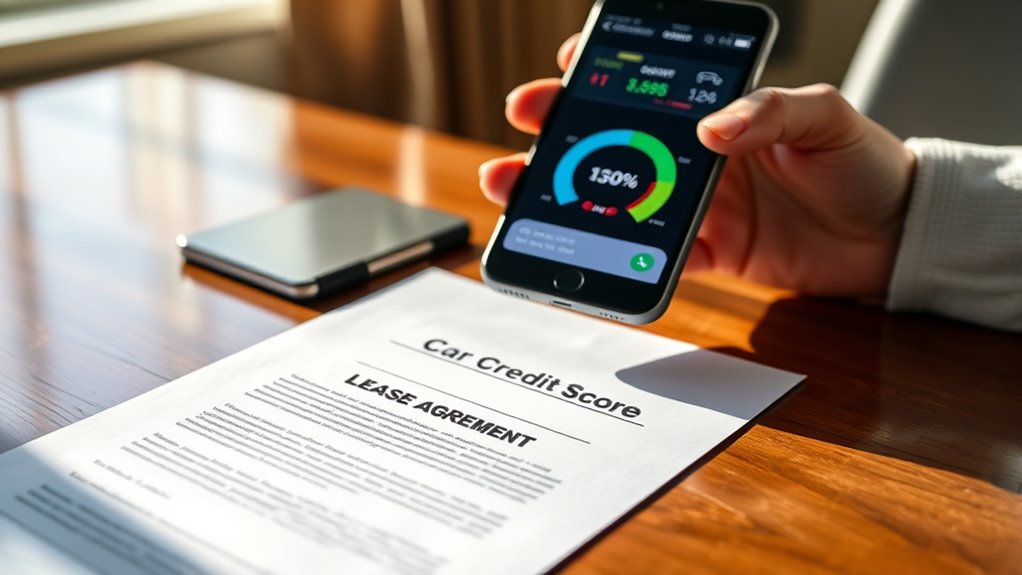Your credit score can greatly affect your chances of approval, the lease terms you get, and the overall cost. A higher score usually means better deals, lower interest rates, and more flexible options. If your score is lower, you might face higher payments or larger deposits. It’s important to understand how your credit influences these details. Keep exploring to discover what smart credit management can do for your next car lease.
Key Takeaways
- Leasing approvals and terms are heavily influenced by your credit score, often more than you realize.
- Some lease programs may exclude applicants with poor credit, limiting options and increasing costs.
- Timely payments during the lease can improve your credit score, but missed payments harm your financial reputation.
- The interest rate and money factor on a lease are directly affected by your creditworthiness.
- Understanding how credit scoring works can help you negotiate better lease terms and avoid unexpected costs.

Your credit score plays a essential role when you’re applying for a car lease, as it helps lenders determine your financial reliability. A higher score shows that you’re responsible with credit, making it easier to access favorable leasing options. Conversely, a lower score might limit your choices or lead to higher interest rates. Lenders use your credit score to evaluate the credit impact of leasing a vehicle, which can influence not only your approval chances but also the terms you’re offered. So, understanding how your credit score affects these factors is indispensable before you start shopping.
Your credit score influences lease approval chances, terms, and interest rates, so understanding its impact is crucial before shopping.
When you explore leasing options, it’s important to realize that your credit score isn’t just a pass/fail metric. It impacts the range of vehicles you can choose from and the lease terms you qualify for. For example, a strong credit score may allow you to secure a lease with lower monthly payments, reduced down payment requirements, or more flexible mileage limits. On the other hand, if your credit isn’t ideal, you might face higher costs or be required to put down a larger security deposit. Some lease programs specifically target those with excellent credit, meaning your score can considerably shape your options from the outset.
The credit impact of leasing is often misunderstood. Many assume that leasing doesn’t affect your credit, but it actually does. When you sign a lease, the account gets reported to credit bureaus just like a loan or credit card. Making timely payments can boost your credit score, while missed or late payments can cause it to drop. If you already have a less-than-stellar credit history, leasing might initially seem like a good way to build positive credit, but it can also deepen financial strain if you’re unable to meet the payment schedule. It’s essential to weigh these risks before committing. Additionally, understanding the importance of scoring models can help you better interpret your credit report and improve your chances.
It’s also worth noting that your credit score influences the leasing terms you’re offered. Lenders see a strong credit profile as a sign that you’re less risky, so they’re more inclined to extend favorable leasing options—like lower interest rates and better vehicle choices. If your credit isn’t perfect, expect to pay more over the lease term, possibly due to higher money factors or interest rates. Being aware of your credit impact helps you negotiate better terms or even improve your score before applying for a lease, ensuring you get the best possible deal.
Frequently Asked Questions
How Quickly Can My Credit Score Change After Leasing a Car?
Your credit score can fluctuate pretty quickly after leasing a car, often within a few days to weeks. The leasing timeline, including your payment history and credit inquiries, impacts these changes. If you make on-time payments and keep your debt low, your score might improve sooner. However, applying for the lease can cause temporary dips. Stay attentive to your credit report to track these short-term fluctuations effectively.
Do Credit Scores Impact Lease Approval Chances Differently Across Lenders?
Your credit score can influence lease approval chances, but lenders weigh your credit history and auto loan details differently. Some prioritize a strong credit history, while others focus more on your auto loan application specifics. This means your approval odds may vary depending on the lender’s criteria, even if your credit score is similar. To improve your chances, maintain a solid credit history and guarantee your auto loan details are favorable.
Are There Specific Credit Score Thresholds for Premium Lease Deals?
Think of lease tiering like climbing a ladder—higher tiers demand better credit scores. For premium lease deals, lenders often set specific credit score thresholds, typically around 700 or higher, to qualify. These thresholds act as gatekeepers, ensuring you meet their standards for luxury or exclusive options. So, if you’re aiming for top-tier deals, maintaining a strong credit score can boost your chances and gain access to those premium lease opportunities.
How Do Late Payments on Leases Affect Long-Term Credit?
Late payments on your lease can negatively impact your long-term credit by damaging your lease payment history. When you miss or delay payments, it updates your credit report, making lenders see you as less reliable. Over time, these negative updates can lower your credit score, making it harder to qualify for future loans or leases. Staying current on your payments helps maintain a positive credit report and supports your financial health.
Can Negotiating Lease Terms Improve My Credit Score Impact?
Imagine steering your lease like a ship, adjusting the sails for smoother sailing. Negotiating lease terms can give you lease term flexibility, helping you manage payments better and potentially prevent late payments. While it may not instantly boost your credit score, it can lead to timely payments, which update your credit report positively. Over time, proactive lease negotiations can contribute to a healthier credit profile, shaping your financial voyage.
Conclusion
Remember, your credit score is the key that unlocks the door to your dream car lease. Don’t let hidden fine print be the shadow lurking in the corner, ready to trip you up. Stay informed and proactive—because a good score isn’t just a number, it’s the map guiding you through the maze. Keep your financial footing steady, and your journey to a new car will be smooth sailing, not a stormy sea.










